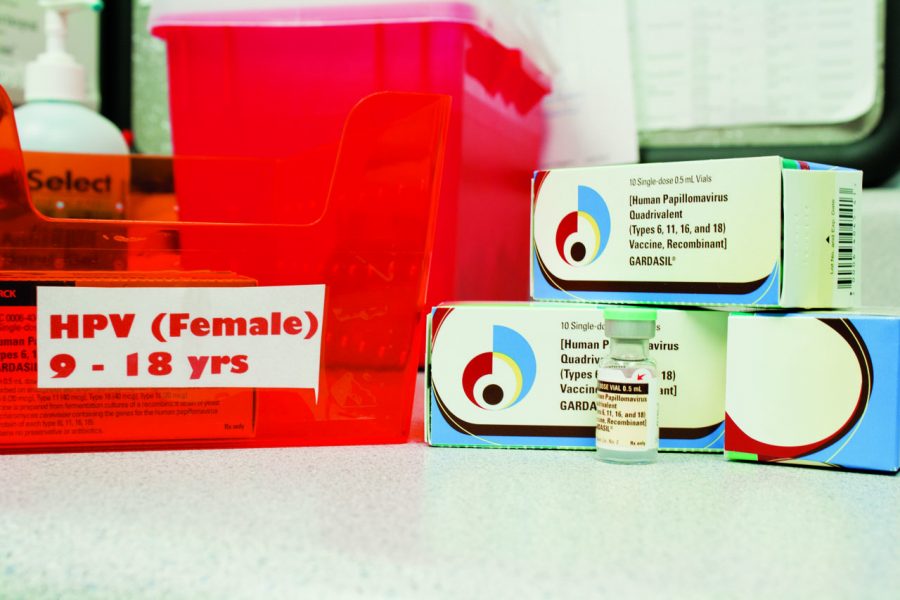Fewer girls, women getting HPV vaccines
January 20, 2011
<span style=
“font-size: 14pt;”>Though the National Cancer Institute reports
that 12,200 new cases and 4,210 deaths related to cervical cancer
were reported in the United States in 2010, new research reveals
that a smaller number of teenage girls and young women are getting
the human papillomavirus (HPV<span style=
“font-size: 14pt;”>) vaccine.
The study found
that around one-third of teenage girls finish the three-dose
regimen, while approximately three-quarters of women fail to start
it at all, according to the University of Maryland School of
Medicine in Baltimore.
Gardasil and
Cervarix are the two vaccines that are recommended for 11 and 12
year-old girls and for females 13 through 26 years old. Gardasil
can also be given to males and protects against four HPV strands,
while Cervarix covers two HPV types that could lead to cervical
cancer. Neither vaccine can cure HPV once it is spread.
Nurse
practitioner Peggy Bergeron said 32 pap smears were conducted at
the UNA Health and Wellness Center in 2010. Out of the 28 that
produced normal results, four cases were abnormal with high levels
of HPV.
“Screening is
the most important thing,” she said. “If the test comes back
abnormal, we refer them out to other gynecologists. You have to
limit your sexual partners and practice safer sex, as women have to
look at their potential for infertility.”
January is
Cervical Health Awareness Month and many organizations are working
to raise awareness about HPV, which the study said infects around
30 percent of 14-19 year olds who are sexually active.
Although the
vaccines have proven beneficial in protecting against HPV and only
produced minor side effects, the Center for Disease Control (CDC)
said around 8 percent of 17,160 adverse event reports involving
Gardasil were considered serious, including hospitalization,
permanent disability, life-threatening illness and
death.
CDC stated that
92 percent of adverse reactions following Gardasil vaccination were
non-serious, with fainting, pain and swelling at the injection
sight, nausea, headache and fever among the most widely-reported
symptoms.
Danielle
Elliot, a certified registered nurse practitioner with Florence
OB/GYN Group, said she has only had one patient die of cervical
cancer within her 25 years of practice and believes regular pap
smears and personal wellness, not HPV vaccines, are the best
prevention methods.
“As a provider
and seeker of healthcare, I think everyone needs to research it,”
she said. “If you don’t want cervical cancer, then take care of
your body and your immune system. The drug representatives say
these vaccines are the best things since sliced bread, but I’m
suspicious of anything that’s been rushed through the
FDA.”
Elliot thinks
fewer women are getting the vaccine or completing the regimen
because of the pain associated with the shot, forgetfulness and/or
lack of health insurance.
Dr. Philip
Wakefield, a gynecologist with OB/GYN Associates of Northwest
Alabama, is a huge proponent of Gardasil and Cervarix and thinks
the vaccines should be administered to all sexually active people
up to 26 years old to prevent the spread of HPV.
“The amount of
cervical cancer in this country is astounding, as it is a very
preventable type of cancer,” he said. “I didn’t have daughters, but
if I did, I would have no questions with vaccinating them. All
college-aged men and women should be vaccinated. It doesn’t promote
them to be more sexually active and I would rather have my kids be
protected than have to play catch up.”
An estimated 20
million residents living in the United States are currently
infected with the HPV virus and around 50 percent of all sexually
active people will get the virus sometime in their lives, according
to the CDC.
Dr. Edward W.
Smith, a doctor of homeopathy at the Florence Wellness Center, said
many mothers are apprehensive about both HPV vaccines but that
knowledge is key when considering the options about getting
children vaccinated.
”I tell parents
to get all the information that they can from the CDC, from HPV in
Pregnancy Registry and from VAER (Vaccine Adverse Event Reporting
System),” he said. “They should talk to their doctor, then make an
intelligent decision about the shot. Parents are the one who will
have to provide 24-hour care for children of adverse
reactions.”












